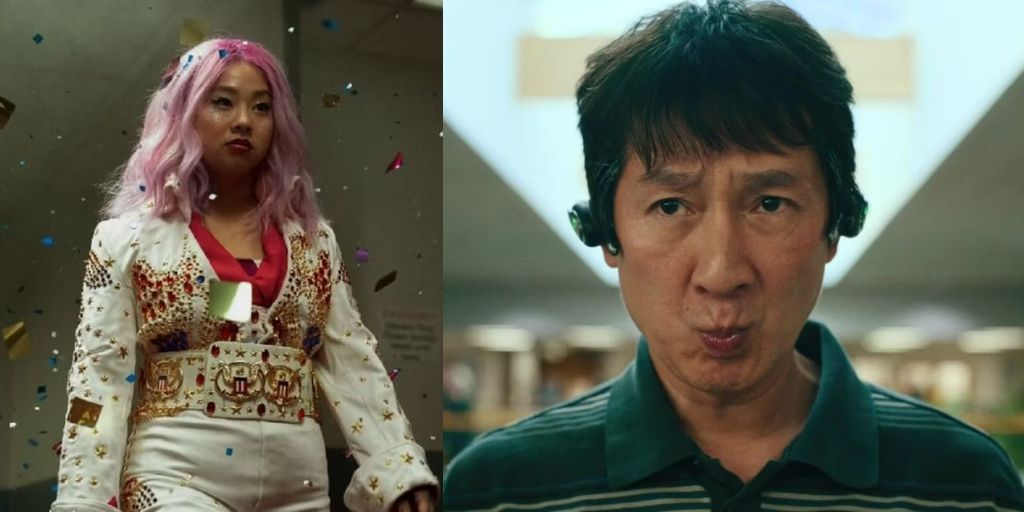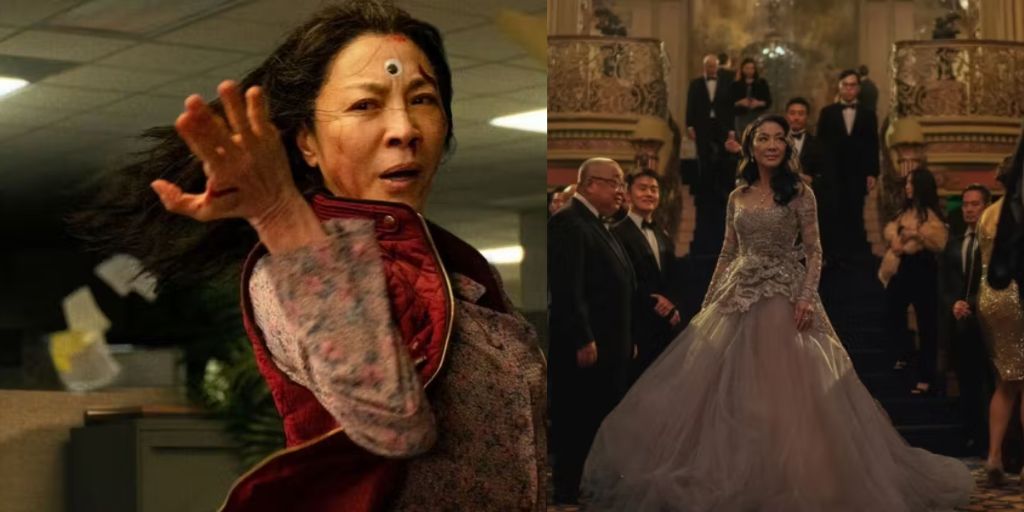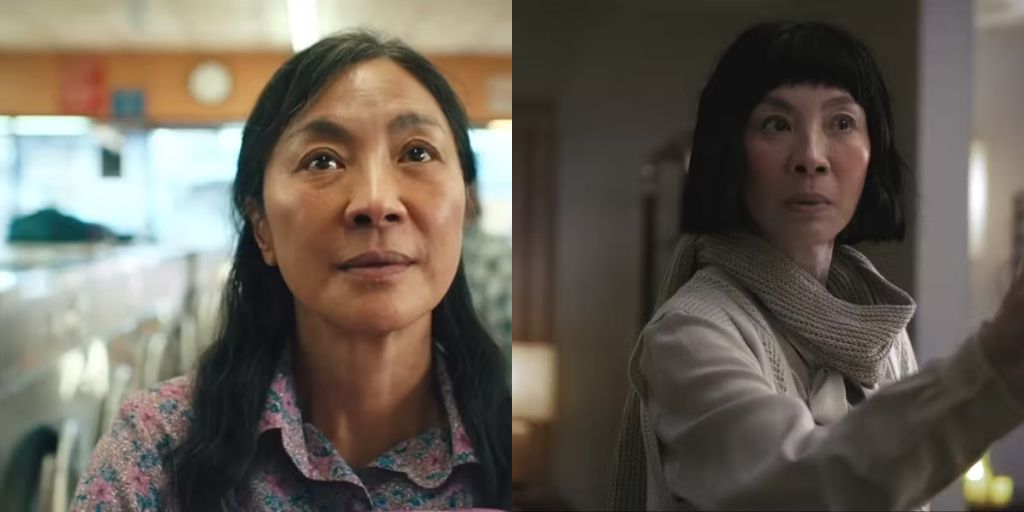Between the big Marvel hits Spider-Man: No Way Home and Doctor Strange in the Multiverse of Madness, A24 released its own film about the multiverse: Everything Everywhere All at Once. Unlike the MCU movies, this film tackled the multiverse concept with more detail and ambition.
The idea behind the multiverse is simple: there are countless universes besides our own. The film’s directors, Daniel Kwan and Daniel Scheinert (known as the Daniels), take this idea further by telling the story of a Chinese-American mother who is trying to manage her laundromat and family.
When her husband from an alternate universe tells her she must save the multiverse, she has to use her special skills from different realities to defeat a great evil threatening all of existence.
Even though the story is complex, audiences love Everything Everywhere All At Once. It became A24’s top-grossing film and won Best Picture at the Oscars. If you haven’t seen the movie or are watching it again, here’s how its parts come together to create a complex and emotional ending.
What is ‘Everything Everywhere All At Once’ About?
The film introduces Evelyn Wang (played by Michelle Yeoh), a tired Chinese-American immigrant. She juggles running a laundromat, dealing with her clueless husband Waymond Wang (Ke Huy Quan), her struggling daughter Joy (Stephanie Hsu), and her sick father Gong Gong (James Hong).
Her life changes during a routine IRS visit when she gets caught in interdimensional chaos. Suddenly, she becomes a hero with access to many versions of herself from different realities. Her biggest challenge is stopping a powerful force threatening to destroy everything.
The movie is filled with mind-bending effects and unusual characters. Yet, at its core, Everything Everywhere All At Once is a personal story about a mother trying to mend her troubled family relationships, especially with her daughter, Joy.
Evelyn’s journey through different universes is not just about saving existence but also about showing her daughter that life is still worth living despite its chaos. Each jump to another reality represents a step toward healing the strained mother-daughter bond.
Jobu Tupaki and the Everything Bagel
One crucial symbol in the film is the everything bagel. The final battle takes place in an IRS building where Evelyn and the Alphaverse agents confront Jobu Tupaki, a version of Joy whose powers come from experiments in the Alphaverse. During this scene, the everything bagel is introduced.

“I got bored one day, then I put everything in a bagel… everything. All my hopes and dreams, my old report cards, every breed of dog, every personal ad on Craigslist… sesame… poppy seed… salt, and it collapsed in on itself. ‘Cause you see, when you really put everything on a bagel, it becomes this… the truth.”
The everything bagel may look like a typical breakfast item, but it represents a cosmic black hole ready to consume anything it encounters. It turns existential dread into a tangible symbol. Tupaki keeps this ominous bagel in an all-white temple, and its circular shape appears throughout the movie.
The bagel’s shape is echoed in Tupaki’s hairpiece, drawings on Evelyn’s tax papers, and even the washing machine door. This endless loop and the bagel symbolize dissatisfaction and the feeling that life has no meaning. Tupaki believes that nothing matters in any universe and wants to use the everything bagel to pull the multiverse into an infinite void.
Waymond Wang and the Power of Love and Kindness
When Evelyn is overwhelmed by Tupaki’s nihilism, her husband Waymond offers a different perspective. Instead of getting lost in the chaos, Waymond finds hope and optimism. In one universe where Evelyn is a Kung-Fu star, Waymond tells her, “You tell me it’s a cruel world and we’re all running around in circles. I know that.
I’ve been on this earth just as many days as you.” He chooses to see the good in things and finds survival through positivity. Waymond states, “When I choose to see the good side of things, I’m not being naive. It is strategic and necessary. It’s how I’ve learned to survive through everything.” His optimism convinces Evelyn that there is more to life than the void Tupaki represents.
Evelyn’s own Waymond supports her with similar encouragement, helping her find the will to fight for what matters. He explains, “I know you are all fighting because you are scared and confused. I’m confused too… But somehow this feels like it’s all my fault.”
Despite the struggles of their laundromat and his doubts about their marriage, Waymond remains hopeful and kind, saying, “I don’t know. The only thing I do know is that we have to be kind. Please. Be kind, especially when we don’t know what’s going on.”
Evelyn learns this lesson and applies it in her battle against Tupaki. Instead of using violence, she uses her multiversal powers to bring happiness to her adversaries, including granting joy to Deirdre Beaubeirdre (Jamie Lee Curtis) in an alternate universe where they are in love.
Nothing Matters in the End, Except…
When Evelyn confronts Jobu Tupaki (who is also her daughter Joy), they all try to pull Tupaki away from the void. Despite their past conflicts, Evelyn, Waymond, and Gong Gong find hope in staying together as a family. Evelyn’s love for Joy gives her the strength to show that life, even with its seeming meaninglessness, is worth living.

Evelyn tells Joy, “no matter what, I still want to be here with you. I will always, always, want to be here with you.” Despite the belief that nothing matters, Evelyn chooses to cherish every moment with her daughter. Their emotional climax shows their vulnerability and healing, breaking cultural norms of Chinese family dynamics.
Evelyn’s universe is set right. She and Waymond rekindle their marriage, Joy is happy, and they are ready to face any challenge together. Jobu Tupaki was right: nothing matters.
But Waymond’s view is also true: if nothing matters, we can choose what does. Even simple things like doing laundry and taxes can be meaningful when done with love.
Everything Everywhere All at Once is now streaming on Max in the U.S.




